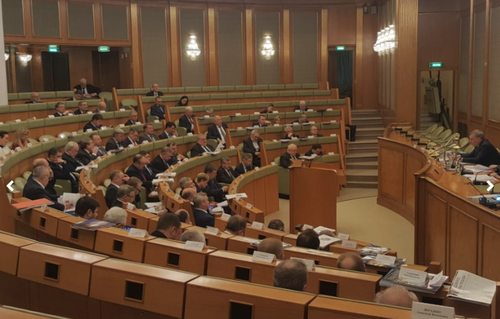ÐÎÑÑÈÉÑÊÈÉ ÏÐÎÔÅÑÑÈÎÍÀËÜÍÛÉ ÑÎÞÇ ÌÎÐßÊÎÂ
SEAFARERS' UNION OF RUSSIA
A NON-UNIONIZED SEAFARER
IS AN UNPROTECTED SEAFARER
Back
More new ships under the Russian flag

Today, in Moscow a meeting of the Government Marine Board took place. Among its participants were representatives of federal agencies of executive and legislative authorities, governors, top managers of shipbuilding industry, shipowners. The Chairman of the Seafarers' Union of Russia, Yury Sukhorukov, also attended the meeteng.
Numerous issues were discussed during the meeting, they concerned the status and prospects of development of inland waterways of the Russian Federation, the measures to increase the merchant fleet, to boost its competitiveness and increase its share in the total volume of of national foreign trade cargoes.
So, by 2024 there will be demand for more than 100 new vessels, incliding icebreakers, LNG carriers, tankers for the transportation of crude oil and gas condensate, as well as support, rescue and hydrographic vessels. They will be designated to provide 80 million tons cargo traffic through Northern Sea Route, stated Deputy Prime Minister Yuri Borisov. He stressed that Russia needed a new modern drycargo fleet, including containerships, bulkers for the export of coal and passenger ships.
-It is important that as many new vessels as possible be registered under the national flag of Russia, and a special focus is being made on it, - said Yuri Sukhorukov. - Aside from the opportunity to significantly increase the share of national foreign trade vessels in the total traffic volume, it will also create new jobs for Russian seafarers with decent labor and social guarantees.
Reference: Marine Board was established in September, 2001. The scope of it's functions covers such the issues as safety of navigation and shipping, the development of their navigation, hydrographic and search and rescue systems, and the protection of maritime cultural heritage objects. Its main task is to coordinate the actions of the authorities and organizations of the maritime industry for the benefit of implementation of the national maritime policy of Russia. The Board’s activities cover the development of maritime activities in Russia; development of the Russian and international regulatory framework; implementation of national and federal target programs in the sphere of shipbuilding, ship modernization and shiprepairing; dealing with problems concerning the study and exploration of World Ocean, the Arctic and the Antarctic; development of science and technology and shipbuilding clusters; development of sea and river ports.
Up
